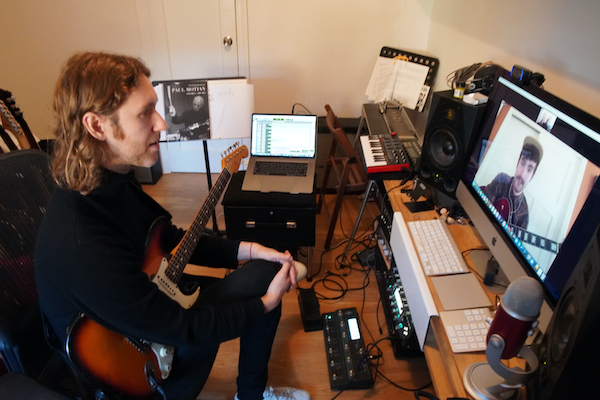Jan 13, 2026 2:09 PM
More Trump-Kennedy Center Cancellations
The fallout from the renaming of the John F. Kennedy Center for the Performing Arts to include President Donald…

Guitarist Nir Felder (left), a faculty member at The New School, delivers online instruction to student Evan Macaluso.
(Photo: Courtesy Nir Felder)For jazz students enrolled in fall classes at The New School in New York City, the “new normal” during the pandemic meant that all instructional activity took place online.
To help students get the maximum benefit from their classes, administrators realized that the first step was to ensure that everyone had the proper equipment.
“The New School recognized that not every student was going to have the hardware, software or internet connection that they might need to succeed,” Keller Coker, dean of the institution’s School of Jazz and Contemporary Music, said via Zoom in November. “Every single registered student—part-time or full-time—was given a technology grant on the first day of school. It was $500 to cover a USB microphone, a piece of software, a better internet connection, whatever they needed. It was $500 transferred directly to their account.
“Students had their syllabi beforehand, and the faculty made sure to identify [the equipment required for each course]. Because of that communication, all students essentially had what they needed by the end of the first week.”
This fall, guitarist Nir Felder and saxophonist Jane Ira Bloom both taught five-week courses called Recording Combo Modules. Felder has helped student musicians learn skills that they can apply to real-world situations following graduation.
“The New School has provided a browser-based platform called Soundtrap, which students can record with, which is great,” Felder said via videoconference. “But a lot of my students are more advanced, and they want to learn [additional] real-world applications, like Pro Tools, Logic and Ableton. We’ve been mainly working in Pro Tools, and students are so excited to learn about how to better record themselves.
“I open up Pro Tools on my computer and I share my screen. I can show them directly how to edit something, how to use a plug-in and how change different sounds. It’s really helpful for them to see it on their screen. If they have a question, I can show them how to do it right away, instead of them, you know, watching a 20-minute YouTube tutorial to find the one thing that they can’t figure out. So, [the class] is very hands-on.”
Coker is a firm believer that in addition to learning musical chops, students should gain technological skills, too: “We had forums with students and faculty, and I asked our faculty members, ‘How much of your living do you make doing the kind of thing we’re about to do during this pandemic?’ And several of them said, ‘Oh, that is how I make the majority of my money. I make it online, doing online lessons, [recording] single tracks, and doing networked recording.’”
Bloom explained that she wants students to embrace the technology that allows them to layer individual instrumental parts into an ensemble recording; however, she also encourages them to not lose sight of the unpredictable, improvisational aspects of making music.
“A lot of times, students are so caught up in the technology of the recording—the oddness of living in a set of headphones—that when we revisit their compositions, [our goal is to figure out] how to get the humanity back in the tracks,” she said. “We [discuss] how to push air molecules through a microphone, how to expand your emotional range in a new recorded world, so that the microphone picks up what you mean. Students are thinking about things like that. And sometimes they even put asymmetry back into their playing, so that it feels human again, as opposed to metric.”
Among the other world-class jazz artists on the faculty are drummer Matt Wilson and trumpeter Dave Douglas. Both musicians helped their students to record, mix and master an entire album during a five-week module.
“It’s incredibly meaningful, the connection between mentors and students right now,” Bloom said. “There’s a heightened sense of commitment and responsibility, because we need our music, and we need to talk about it, and we need to make it together. Our imagination and creativity are so important to the students right now. You just want to give it your all, because you can sense the need is there.” DB
This story originally was published in the February 2021 issue of DownBeat. Subscribe here.

Belá Fleck during an interview with Fredrika Whitfield on CNN.
Jan 13, 2026 2:09 PM
The fallout from the renaming of the John F. Kennedy Center for the Performing Arts to include President Donald…

Peplowski first came to prominence in legacy swing bands, including the final iteration of the Benny Goodman Orchestra, before beginning a solo career in the late 1980s.
Feb 3, 2026 12:10 AM
Ken Peplowski, a clarinetist and tenor saxophonist who straddled the worlds of traditional and modern jazz, died Feb. 2…

The success of Oregon’s first album, 1971’s Music Of Another Present Era, allowed Towner to establish a solo career.
Jan 19, 2026 5:02 PM
Ralph Towner, a guitarist and composer who blended multiple genres, including jazz — and throughout them all remained…

Rico’s Anti-Microbial Instrument Swab
Jan 19, 2026 2:48 PM
With this year’s NAMM Show right around the corner, we can look forward to plenty of new and innovative instruments…

Richie Beirach was particularly renowned for his approach to chromatic harmony, which he used to improvise reharmonizations of originals and standards.
Jan 27, 2026 11:19 AM
Richie Beirach, a pianist and composer who channeled a knowledge of modern classical music into his jazz practice,…